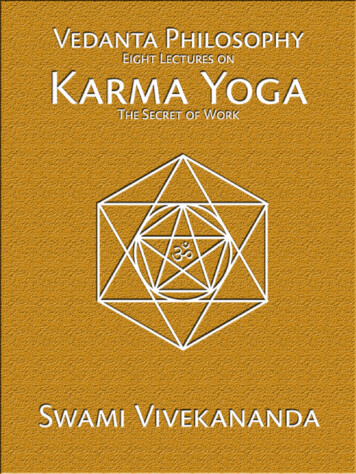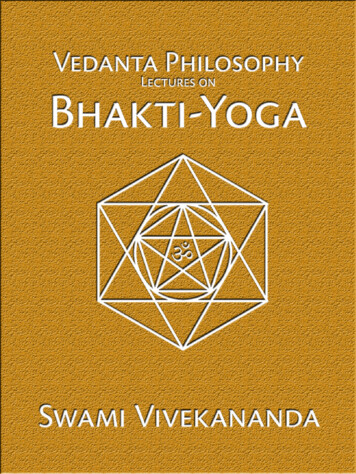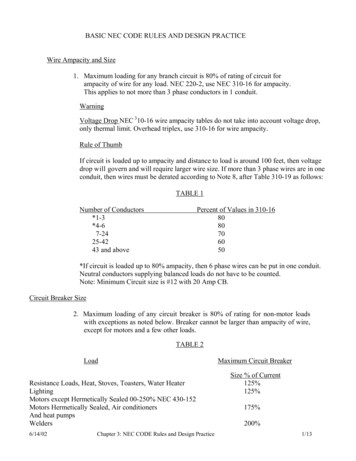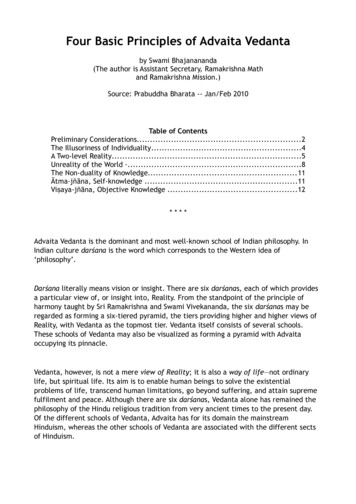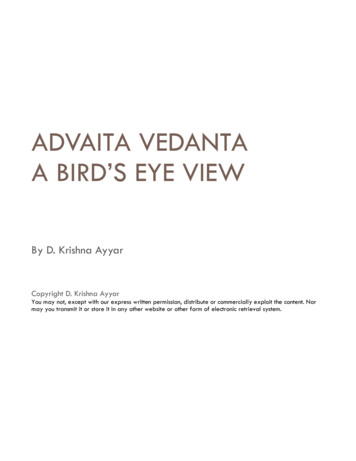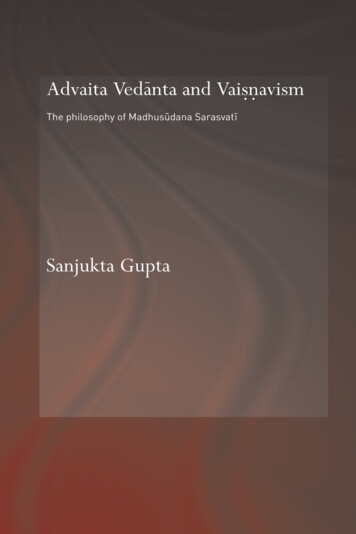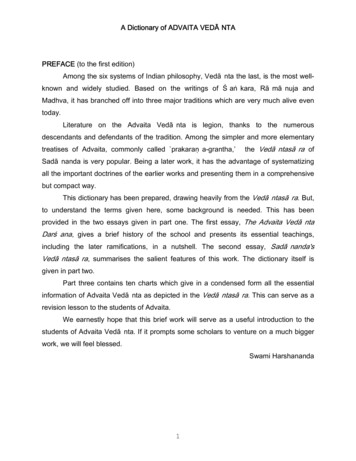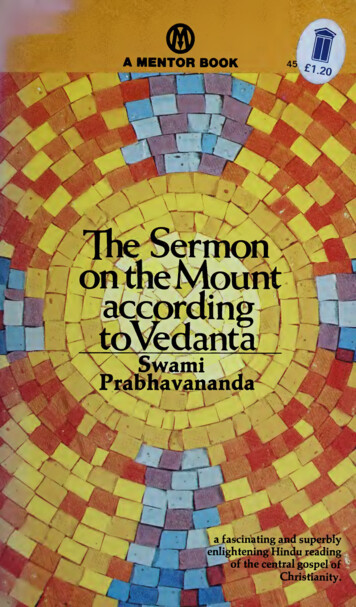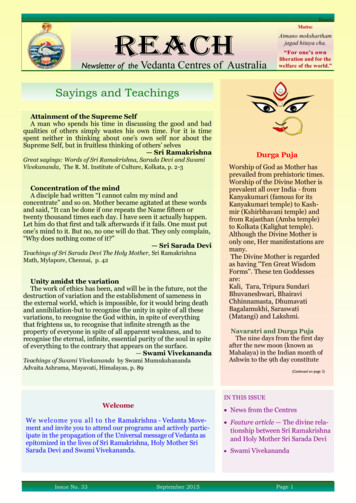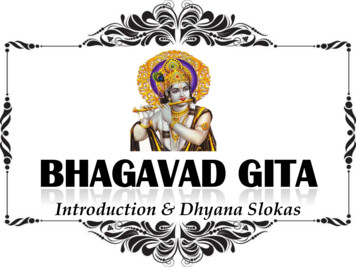
Transcription
Introduction & Dhyana Slokas
INDEXS. No.TitleIIntroductionIIGita Dhyana SlokamPage No.11. Verse 132. Verse 243. Verse 354. Verse 465. Verse 576. Verse 697. Verse 7108. Verse 8119. Verse 912[i]
INTRODUCTION
Why study Gita? Gita Mahatmyam – Greatness of Gita. Jiva has taken birth in body to experience Joy and sorrow to exhaust Punya Papams ofpast Janmas. Study of Gita will help one to get unaffected by 2 fold experiences of life – Sukhamand Dukham. If a person contemplates on Gita, he will not get affected by the past, just as the lotusis not affected b the water. Dwell on meaning of Gita – “Artha Grahanam” instead of Shabda Grahanam. Papams trigger guilt and Gita removes the guilt and guides us not to repeat action. Like we smear oil to cut Jackfruit, smear oil of Gita to face difficult situations in life. Prarabda experiences give Sukham and Dukham in life. Without purifying the mind, we can’t understand the philosophy of life, ArthaPradhanam. During study of Gita, Devas present, hence look at Gita study with great reverence. Devas will help person who contemplates on Gita. Gita is song of secrets and truths. Param Vidya, supreme knowledge, has unseen power, subtler than electro magneticwaves of cellphones.1
Subject matter is “imperishable Atma”, Sashvata. Gita Parayanam gives Adrishta Phalam and Jnanam gives Drishta Phalam. Invisible power blesses us with visible power of knowledge. Happiness through sense organs is limited, Shastra Vichara gives Para Ananda. Moksha Ananda entirely different than Dharma, Artha, Kama, Ananda. Gita gives Tatva Artha and Yoga Shastra. One who does Parayanamof 18 Chapters attains Jnana Siddhi and Moksha. Mind withdrawn from world and focussed on Parayanam will bless with opportunitiesto listen to meaning. Meaning gives Jnana Siddhi and ultimate Ananda. Jnana Siddhi and Moksha Ananda is Simultaneous. Parayanam requires unwavering mind, focussed Satvic activity in morning. Gita is Jnana Kavacham which protects us at all times. Our Buddhi Shakti limited, Shastras Shakti – unlimited, obey Shastram. We experience pleasures and pains as per our previous Karmas and Shastram givesstrength to face them. Balanced mind – Vaikunta, no pleasure, pain.2
GITA DHYANA SLOKAMBy Madhusudhana Saraswati
Verse 1 :Om, O! Bhagavad-gita, with which Partha (Arjuna) was enlightened by the Lord Narayana Himself andwhich was incorporated in the Mahabharata by the ancient sage Vyasa, the divine Mother, who isperennially showering the nectarine philosophy of advaita in the form of eighteen chapters, upon Thee, O!blessed Mother, I constantly meditate. You are - the sure antidote to the rocking experience of change the destroyer of samsara (rebirth). [Dhyana Sloka 1]Matru Stuti : Gita, Mother, Nourishes mind, intellect equipment.6 fold qualities of Bagawan :a) Jnanam (Knowledge)b) Vairagyam (Dispassion)c) Yashas (Fame)d) Sreehi (Wealth)e) Aishvaryam (Overlordship)f) Veeryam (Resolve) Lord has ability to destroy our sorrow and bondage.3
Verse 2 :Salutations unto Thee, O Vyasa! of mighty intellect, who has eyes like the petals of a full-blown lotus, bywhom was lighted the lamp of Knowledge filled with the Mahabharata oil. [Dhyana Sloka 2]Vyasa Stuti : Namaskara to Veda Vyasa. Vishala Buddhi, author of Mahabaratha (1 Lakh slokas) 18 Puranas, Brahma Sutra(555). Lights up my mind (Lamp) with oil of Mahabarata, Gita is the wick.4
Verse 3 :Salutations to Krsna who is a tree of fulfilment (Parijata or Kalpataru) - the bestower of all desires to all those whototally surrender to Him, who has milked the Gita nectar, the holder of jnanamudra, the wielder of the cane inone hand with which He drives home the herd of cattle under His protection. [Dhyana Sloka 3]Krishna Stuti : Krishna like wish fulfilling free, surrender, Karma Phala Dhata. Reins of Horses shows sense organs control.Chin Mudra Jnana Mudra :3 Fingers :- 3 states- Waking, Dream, Sleep.Index Finger :- Jivatma- IndividualThumb :- Paramatma- Without thumb fingers useless 2 fingers joining and making a circle indicates Poornatvam. Krishna refines our mind, captivates with the Amruta milk of Geeta, Nectar, relieves us5from Samsara cycle of birth and death.
Verse 4 :All the Upanisads are the cows, the son of the cowherd namely Krsna, is the milkman, Partha is the calf, men of purifiedintellect are the enjoyers, and the supreme nectar of the Gita is the milk. [Dhyana Sloka 4]Gita Mahima : Cows give milk in presence of calf. Krishna, milks the cow – Milkman. Arjuna – calf – Nimitta, cause of Gita Upadesa. UpanishadGitaCowEssence of UpanishadMilk is Amrutam gives Jnanam and Moksha, liberation.6
Verse 5 :I salute Lord Krsna, the teacher of the universe, the divine son of Vasudeva, the destroyer of Kamsa and Canura, thesupreme joy of Devaki. [Dhyana Sloka 5] Krishna Stuti. Ananda Murti. Ananda invoked as Bagawan.Taittriya Upanishad :He knew that bliss was Brahman, for, from Bliss all these beings are produced, by Bliss do these beings live.They go to Bliss on departing and become one with it – this is the knowledge learnt by Bhrgu and taught byVaruna. This is established in the supreme space – in the excellent cavity of the heart. He who knows thusbecomes one with Brahman. He becomes the possessor (assimilator) of food and the eater (enjoyer) of it.He becomes great in progeny, cattle and gains the splendor of true brahmana-hood. Indeed, he becomesgreat through fame and renown. [III – VI – 1]7
Krishna killed several Rakshasas Kamsa, Chanura. Destroys Adharma in the world.Gita :For the protection of the good, for the destruction of the wicked and for the establishment ofrighteousness, I am born in every age. [Chapter 4 – Verse 8] Jagat Guru. We understand our duties by worshipping Krishna.8
Verse 6 :The river of battle - with Bhisma and Drona, as its banks; with Jayadratha, as its waters; with the king ofGandhara, as the blue water-lily; Salya as the shark; Krpa as the current; Karna as the breaker; Asvathamaand Vikarna as the terrible crocodiles; Duryodhana as the whirlpool in it - was indeed crossed over by thePandavas with Kesava as the ferryman. [Dhyana Sloka 6]-Mahabaratha WarMighty RiverRiver of battlefieldBhishma and Drona – 2 banksShalya – SharkKarna – Gaint waveAshvattama Vikara – CrocodilesDuryodana – WhirlpoolNilophala - Rocks- Krishna – Boatman for Pandavas.- Cross sorrow by Anugrahma graceof Krishna.9
Verse 7 :May the spotless lotus of the Mahabharata, born in the waters of the words of the son of Parasara (i.e.Vyasa), having its sweet and pleasant fragrance of the true significance of Gita, with many narratives as itsinner soft petals, fully blossomed by the stories of hari, and joyously drunk day after day by the six-footed(honeybees) in the form of the good and pure men of the world, be productive of the supreme good to uswho are eager to destroy and safely come out of the inner imperfections of the Iron Age. [Dhyana Sloka 7]Mahabharatha Stuti : Mahabaratha like lotus gives us fragrance of happiness. Means to attain Dharma, Artha, Kama, Moksha. Many stamens of lotus are the values prescribed in Gita. Wise people are the honey bees who enjoy the lotus and relish in it. Destroy low level negative mind with impurities.10
Verse 8 :I salute that supreme Bliss, Madhava, whose grace renders the mute eloquent and makes the cripple scalemountains. [Dhyana Sloka 8] Praise of Bhagawan. Mute start talking, Lame climb mountains, Jiva crosses Samsara Boga, mountain ofdesires with Sukham and Dukham. Showers Karma Phalam in his presence. By Sraddha and Bakti one earns Lords grace.11
Verse 9 :Salutations to that Godhead whom the Creator Brahma, Lord Varuna, Lord Indra, Lord Rudra and the Lord of the Marutasinvoke with their divine hhymns; whom the singers of Sama songs invoke through their correct and appropriate chantings,whom the yogis realise with minds absorbed in the goal of their contemplation through perfect meditation and whoselimits are not known even to the denizens of the heavens or to the asuras of the nether kingdom. [Dhyana Sloka 9] Praise of Param Brahma. My Namaskara to Bhagawan who is also worshipped by Devas. Rig, Yajus, Sama, Atharvana Veda 6 Angas.SikshaPhoneticsKalpaPuja RitualsNiruktahaOrigin of ious time for Ritual12
Recitors of Sama Veda have knowledge of 6 limbs. Yogi – Contemplates on true nature of God, Absorbed in Tattva Jnana Drishti. Chanting of Slokas give Chitta Shuddhi.Authority of ScripturesPrasthana TrayamGitaUpanishadsBrahma Sutra- Krishna Teacher- Vyasa Compiler13
Mind withdrawn from world and focussed on Parayanam will bless with opportunities to listen to meaning. Meaning gives Jnana Siddhi and ultimate Ananda. Jnana Siddhi and Moksha Ananda is Simultaneous. Parayanam requires unwavering mind, focussed Satvic activity in morning. Gita is Jnana Kavacham which protects us at all times.
